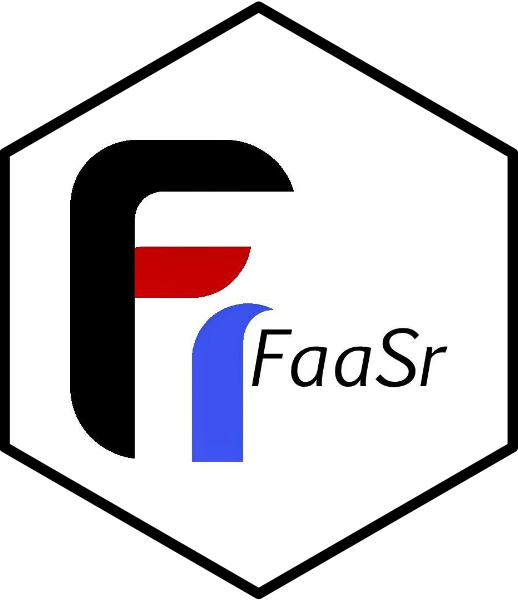

The goal of FaaSr is to make it easy for developers to create R functions and workflows that can run in the cloud, on-demand, based on triggers - such as timers, or repository commits. It is built for Function-as-a-Service (FaaS) cloud computing, and supports both widely-used commercial (GitHub Actions, AWS Lambda, IBM Cloud) and open-source platforms (OpenWhisk). It is also built for cloud storage, and supports the S3 standard also widely used in commercial (AWS S3), open-source (Minio) and research platforms (Open Storage Network). With FaaSr, you can focus on developing the R functions, and leave dealing with the idiosyncrasies of different FaaS platforms and their APIs to the FaaSr package.
FaaSr allows you to: * Develop one or more functions natively in R in your own GitHub repository * Deploy actions that invoke your functions in Docker containers * Compose workflows consisting of multiple actions in a pre-determined order, described by a Directed Acyclic Graph (DAG) * Register your workflows for cloud-native execution in one of the supported FaaS providers * Invoke your workflows with events, including scheduled timers * Use S3-based cloud storage to provide file inputs and outputs to each action in the workflow
The functions exposed by FaaSr can be broadly divided as follows: * Server-side functions: are executed automatically in the cloud, by your functions/workflows. These deal with moving data from/to S3 storage and logging * Client-side functions: are executed interactively by you, in your local desktop. These deal with registering and invoking your workflows for execution in your FaaS provider of choice
faasr_get_file(server_name, remote_folder, remote_file, local_folder, local_file)
downloads a file from an S3 server to be used by an actionfaasr_put_file(server_name, remote_folder, remote_file, local_folder, local_file)
uploads a file from an action to an S3 serverfaasr_delete_file(server_name, remote_folder, remote_file)
deletes a file from an S3 serverfaasr_arrow_s3_bucket(server_name) returns an arrow
object for use with S3 serverfaasr_log(message) adds a message to the log of the
running actionworkflow <- faasr(configuration_file, credentials_file)
returns a workflow list associated with a workflow
configuration file (in JSON format) and file with credentials for S3 and
FaaS server(s)workflow$register_workflow() registers a
workflow with the configured FaaS providerworkflow$invoke_workflow() immediately invokes a
workflow with the configured FaaS providerworkflow$set_workflow_timer(cron_string) set a timer
(using the standard CRON format) to invoke a workflow at a
given time interval with the configured FaaS providerworkflow$unset_workflow_timer() unset a timer
previously defined with set_workflow_timer()Workflows are configured using the JSON file format and the FaaSr configuration schema.
You may use the FaaSr-JSON-Builder Shiny app to create and edit workflows using a graphical user interface (GUI) rather than a text editor. This GUI can be used to create FaaSr-compliant JSON files from scratch (or starting from an exiting configuration you can upload using the tool). The generated configuration can be downloaded to your computer.
The client-side FaaSr functions expect both a JSON configuration file describing a workflow, and an environment variable file storing the credentials for your FaaS cloud platforms of choice. The example below shows a template for S3 cloud storage, GitHub Actions, OpenWhisk and AWS Lambda credentials:
"My_GitHub_Account_TOKEN"="REPLACE_WITH_YOUR_GITHUB_TOKEN"
"My_Minio_Bucket_ACCESS_KEY"="REPLACE_WITH_S3_ACCESS_KEY"
"My_Minio_Bucket_SECRET_KEY"="REPLACE_WITH_S3_SECRET_KEY"
"My_OW_Account_API_KEY"="REPLACE_WITH_YOUR_OPENWHISK_ID:SECRET_KEY"
"My_Lambda_Account_ACCESS_KEY"="REPLACE_WITH_YOUR_AWS_LAMBDA_ACCESS_KEY"
"My_Lambda_Account_SECRET_KEY"="REPLACE_WITH_YOUR_AWS_LAMBDA_SECRET_KEY"
FaaSr can be installed from CRAN with:
install.packages("FaaSr")You can install the development version of FaaSr from GitHub with:
devtools::install_github("FaaSr/FaaSr-package")Please refer to the FaaSr tutorial for a detailed step-by-step example that you can run on your own desktop (using Rocker) or on Posit Cloud, using just a GitHub account and the free-for-testing Minio S3 Play server